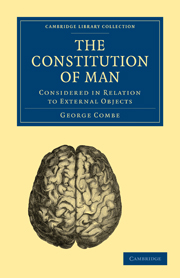Book contents
- Frontmatter
- PREFACE
- Contents
- CHAPTER I ON NATURAL LAWS
- CHAPTER II OF THE CONSTITUTION OF MAN, AND ITS RELATIONS TO EXTERNAL OBJECTS
- CHAPTER III TO WHAT EXTENT ARE THE MISERIES OF MANKIND REFERABLE TO INFRINGEMENTS OF THE LAWS OF NATURE
- CHAPTER IV ON THE COMBINED OPERATION OF THE NATURAL LAWS
- CONCLUSION
- APPENDIX
- Frontmatter
- PREFACE
- Contents
- CHAPTER I ON NATURAL LAWS
- CHAPTER II OF THE CONSTITUTION OF MAN, AND ITS RELATIONS TO EXTERNAL OBJECTS
- CHAPTER III TO WHAT EXTENT ARE THE MISERIES OF MANKIND REFERABLE TO INFRINGEMENTS OF THE LAWS OF NATURE
- CHAPTER IV ON THE COMBINED OPERATION OF THE NATURAL LAWS
- CONCLUSION
- APPENDIX
Summary
The question has frequently been asked, What is the practical use of Phrenology, even supposing it to be true? A few observations will enable us to answer this inquiry; and, at the same time, to present a brief summary of the doctrine of the preceding Essay.
Prior to the age of Galileo, the earth and sun presented to the eye phenomena exactly similar to those which they now exhibit; but their motions appeared in a very different light to the understanding.
Before the age of Newton, the revolutions of the planets were known as matter of fact; but the understanding was ignorant of the principle of their motions.
Previous to the dawn of modern chemistry, many of the qualities of physical substances were ascertained by observation, but their ultimate principles and relations were not understood.
Knowledge may be rendered beneficial in two Ways,—either by rendering the substance discovered directly subservient to human enjoyment; or, where this is impossible, by modifying human conduct in harmony with its qualities. While knowledge of any department of nature remains imperfect and empirical, the unknown qualities of the objects belonging to it, may render our efforts either to apply or to accord with those which are known, altogether abortive. Hence it is only after ultimate principles have been discovered, their relations ascertained, and this knowledge has been systematised, that science can attain its full character of utility. The merits of Galileo and Newton consist in having rendered this service to astronomy.
Before the appearance of Drs Gall and Spukzheim, mankind were practically acquainted with the feelings and intellectual operations of their own minds; and anatomists knew the appearances of the brain.
- Type
- Chapter
- Information
- The Constitution of ManConsidered in Relation to External Objects, pp. 283 - 296Publisher: Cambridge University PressPrint publication year: 2009First published in: 1828

